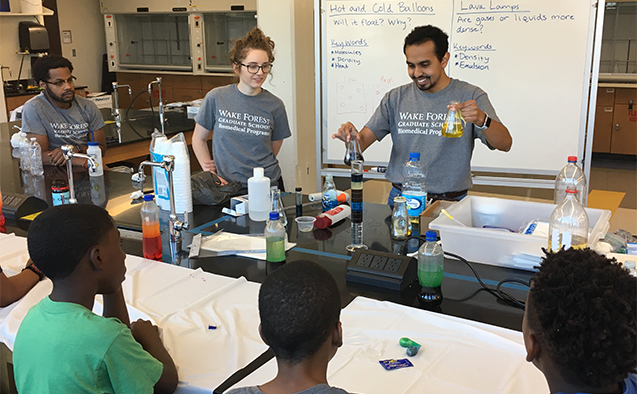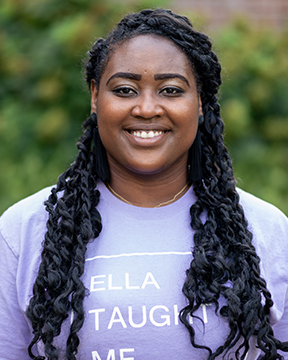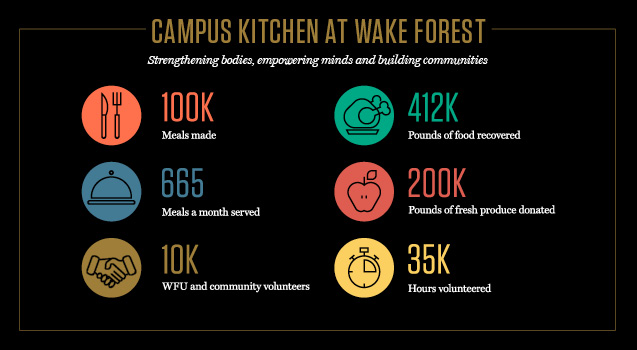WFU’s Office of Civic & Community Engagement reflects expanded Pro Humanitate commitment
There’s no mistaking the purpose of the Office of Civic & Community Engagement as Wake Forest University’s central hub for community-based activities, including service, teaching and research.
The recently reconfigured office combines the spirit of Wake Forest’s beloved Pro Humanitate motto with a new name, website and physical footprint that reflect its mission to engage community partners, faculty, staff and students to affect meaningful social change.
“The Office of Civic & Community Engagement builds on the work of generations of Wake Forest University students, faculty and staff by maintaining our philanthropic and service traditions, supporting new and existing community partnerships and refining our commitment to civic learning and social justice education.” Marianne Magjuka, executive director of the Office of Civic & Community Engagement and Assistant Dean of Students
The rollout is the culmination of a yearlong community engagement mapping project to better understand how Wake Forest is engaged beyond campus. Faculty and staff identified 86 distinct programs, initiatives or projects supporting community-based service, engagement, research or teaching.
As one of the largest employers in Forsyth County, Wake Forest impacts the local community in significant and enduring ways, and the Office of Civic & Community Engagement aims to make that easier and more meaningful.
“The office facilitates our institutional commitment to Winston-Salem, North Carolina and beyond while continuing our work with local and regional organizations to leverage resources, build capacity and incubate community initiatives,” Magjuka said.
Familiar faces, expanded community footprint
As director of community partnerships, Shelley Sizemore leads the team that works directly with community partners and helps facilitate their relationships with faculty, staff and students, with a focus on the three specific areas most commonly identified in the community engagement mapping project:
- Educational equity: The Office of Civic & Community Engagement aims to partner with schools, neighborhoods and organizations to support lifelong learning and equitable educational outcomes for all students in Forsyth County. For example, ACE Fellow Alan Brown, an associate professor of education, connects his engaged teaching, research and scholarship with his support for community needs and projects in the form of an after-school literacy program. Additionally, the Freedom School, led by assistant professor of education Dani Parker Moore, is a summer program for elementary and middle-school students aimed at strengthening children’s reading skills and closing achievement gaps.
- Health and nutrition: The Office of Civic & Community Engagement strives to impact health outcomes in Forsyth County through access to food, fresh produce and medical care. Campus Kitchen, an organization focused on addressing food insecurity, has prepared more than 100,000 meals for those in need in the community since 2006.
- Economic empowerment: Wake Forest supports an inclusive local economy. The Office of Civic & Community Engagement builds capacity in neighborhoods, organizations and nonprofits that provide affordable housing, workforce development and asset-building. For example, Wake Forest sponsors 18 AmeriCorps VISTA (Volunteers in Service to America) members serving in non-profit organizations and schools such as Habitat for Humanity, The Shalom Project and Neighbors for Better Neighborhoods to help eradicate poverty.
For Camry Wilborn, assistant director of community partnerships, the opportunity to return to her hometown and alma mater was particularly meaningful because her new role represents the intersection of many of the values her mother instilled in her, particularly prioritizing education by bringing it back to the community and facilitating access to what she has been afforded.
Wilborn is also excited to anchor the Office of Civic & Community Engagement’s satellite space at 915 Bridge St. the West End, which is intended to make engagement with community partners easier and more substantive.
“Our central location really shows Wake Forest’s commitment to being a place where people can come without the barriers of not knowing where to go or where to park. It also enables us to reach out, as a strong pillar in the community, to our neighbors in new ways,” Wilborn said.
Upholding WFU’s tradition of service and service learning
The Office of Civic & Community Engagement furthers the work of its institutional predecessors – the Volunteer Service Corps and Pro Humanitate Institute – by facilitating meaningful opportunities for students, faculty and staff to volunteer in the surrounding area. It also raises awareness and funds for issues that deeply affect the University’s neighbors. Wake Forest remains committed to the Brian Piccolo Cancer Fund, which has raised more than $3 million since 1980 to support innovative cancer research at the Comprehensive Cancer Center of Wake Forest University Baptist Medical Center.
Brad Shugoll, associate director of service and leadership, continues to oversee direct volunteer engagement, civic leadership and service traditions at Wake Forest, including Project Pumpkin, Hit the Bricks and Wake N’ Shake, which raised more than $525,000 last year. Other programs under his leadership include SPARC (Students Promoting Action and Responsibility in the Community), a four-day, service-oriented, pre-orientation program for first-year students and Campus Kitchen.
Civic learning, democratic engagement and social justice education
The Office of Civic & Community Engagement also provides support, resources and guidance for students interested in organizing for meaningful social change. Whether they are convening to discuss local, national and international issues; advocating for and standing in solidarity with marginalized populations; hosting speakers, panels and campus events; or forming groups to explore issues of identity and justice, the Social Justice Incubator and BRANCHES social justice retreat are two of the ways students can collaborate, engage and organize to affect meaningful change.
“We do this work because we believe in educating our students to be thoughtful, engaged citizens in their communities. The new office will allow us to connect students, faculty and staff in Winston-Salem and work with organizations to create sustainable change,” said Magjuka.
Office of Civic and Community Engagement staff are located in Benson University Center on Campus and at 915 Bridge St.




